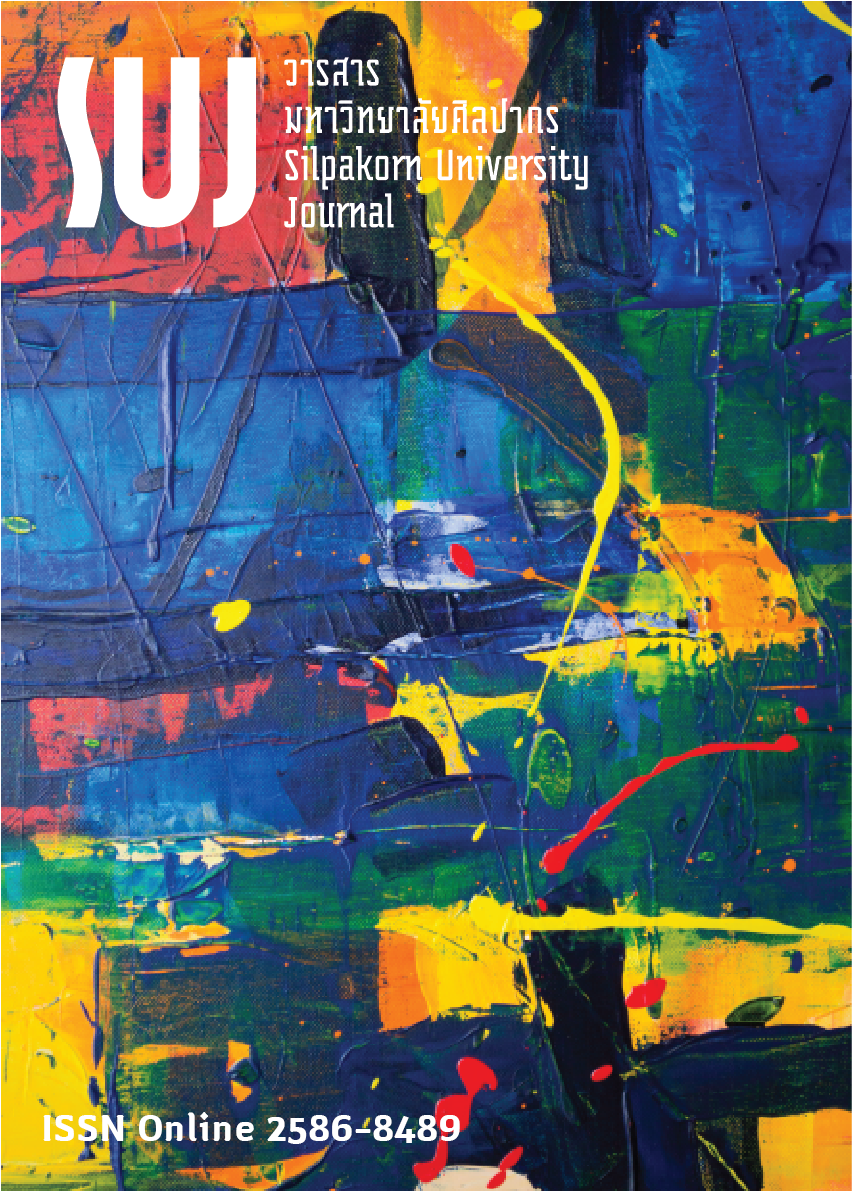ผลกระทบจากการดำเนินธุรกิจในบทบาทคนกลางของประเทศจีน ต่อระบบตลาดผักและผลไม้ของไทยในมาเลเซียและสิงคโปร์ ภายใต้กรอบประชาคมเศรษฐกิจอาเซียน (The effect from business role of Chinese’s middleman in Thai vegetables and fruit market in Malaysia and Singapore within Asean Economics Community)
Main Article Content
Abstract
การศึกษานี้มีวัตถุประสงค์ คือ (1) เพื่อศึกษาช่องทางการจัดจำหน่ายของผักและผลไม้ไทยไปตลาดประเทศมาเลเซียและสิงคโปร์ (2) เพื่อศึกษาการดำเนินธุรกิจของคนกลางผักและผลไม้ไทยในตลาดประเทศมาเลเซียและสิงคโปร์ และ (3) เพื่อศึกษาวิเคราะห์ผลกระทบการดำเนินธุรกิจคนกลางจากประเทศจีน ในตลาดผักผลไม้ของไทยในประเทศมาเลเซียและสิงคโปร์ โดยใช้วิธีการสัมภาษณ์แบบไม่มีโครงสร้างกับเกษตรกร ผู้ประกอบการ คนกลางและผู้ส่งออก กลุ่มนักวิชาการ นอกจากนี้ ยังใช้วิธีวิเคราะห์จุดแข็ง จุดอ่อน โอกาส และอุปสรรค (SWOT Analysis) เพื่อวิเคราะห์การดำเนินงานของคนกลางในช่องทางการจัดจำหน่ายและการกระจายสินค้าในระบบการตลาดส่งออกผักและผลไม้ในประเทศมาเลเซียและประเทศสิงคโปร์ ผลการวิจัยพบว่า ประเทศมาเลเซีย สิงคโปร์ เป็นคู่ค้าที่สำคัญของไทย และส่วนใหญ่จะส่งสินค้า ผัก ผลไม้ และพืชเศรษฐกิจอีกหลายอย่าง จากการศึกษา พบว่า 1) ช่องทางการจัดหน่ายทั้ง 2 ประเทศนี้ นิยมใช้เส้นทางรถยนต์เป็นหลัก เพราะมีความสะดวก รวดเร็ว สามารถเข้าถึงได้ง่ายทุกรัฐในประเทศมาเลเซีย เช่น เหมาส่งสินค้าเข้าไปยังตลาดกลาง หรือผู้นำเข้าโดยตรง อาจจะผ่านคนกลางขั้นเดียวหรือหลายขั้นแล้วแต่ความสัมพันธ์แต่ละระดับแตกต่างกัน ส่วนประเทศสิงคโปร์เป็นตลาดที่มีกำลังซื้อสูง เพราะสิงคโปร์ไม่มีแหล่งทรัพยากรธรรมชาติ จึงต้องนำเข้าจากประเทศไทย ช่องทางการจำหน่ายสินค้าจากไทยไปยังสิงคโปร์จะคล้ายกับจากไทยไปยังมาเลเซีย 2) ช่องทางการดำเนินธุรกิจ มีคนกลางทั้งฝ่ายไทยและฝ่ายมาเลเซียและสิงคโปร์ ซึ่งอาจจะไม่รู้จักหรือรู้จักกันก็ได้ แต่ทั้งประเทศมาเลเซียและประเทศสิงคโปร์มีระเบียบและกฎเกณฑ์ในการนำเข้า และมีการทำสัญญาแบบ Contract farming กับเกษตรกรโดยตรง แต่มีผลกระทบต่อการค้า คือ อัตราแลกเปลี่ยนและราคาซื้อขายสินค้าจากต้นทางและปลายทาง ซึ่งการเจรจาต่อรองขึ้นอยู่กับความไว้วางใจซึ่งกันและกันระหว่างผู้ซื้อกับผู้ขาย 3) วิเคราะห์ผลกระทบด้านการดำเนินธุรกิจด้านบทบาทคนกลาง จากการศึกษาขั้นต้น พบว่ามีผลกระทบน้อยมากหรืออาจจะไม่มีเลย เพราะว่าการนำเข้าผักผลไม้และการดำเนินธุรกิจแข่งขันขายสินค้าเข้าไปในมาเลเซียและสิงคโปร์ ไม่มีคนจีนที่เข้ามาดำเนินธุรกิจแข่งขันขายสินค้า เพราะเป็นชาวจีนที่อาศัยอยู่ในสองประเทศนี้เป็นจำนวนมาก จึงไม่ส่งผลกระทบต่อตลาดผักและผลไม้ไทยในมาเลเซียและสิงคโปร์
The study aimed to: 1) investigate distribution channels of Thai vegetables and fruit to Malaysia and Singapore markets, 2) examine a middleman’s business role in Malaysia and Singapore markets, and 3) analyze the effect from business role of Chinese’s middleman in Thai vegetables and fruit market in Malaysia and Singapore. An unstructured interview method was used to interview agriculturists,
middlemen, exporters, and academics. Apart from this, SWOT Analysis was also employed to analyze the middleman’s role in the distribution channels and product distribution of vegetables and fruit export
marketing system in Malaysia and Singapore. The results revealed that Malaysia and Singapore are Thailand’s major trading partners. Vegetables, fruit and industrial drops are the most exported goods. In addition, the following findings were identified. 1) Car routes are mainly used as a distribution channel of the 2 countries. It is convenient, fast, and easily accessible to all states in Malaysia. For instance, wholesale goods might be transported directly to the central market or importers might deliver through only single or multiple middlemen depending on the level of the relationship. Regarding Singapore, it has a market with high purchasing power owing to lack of natural resources. Therefore, Singapore needs to import goods from Thailand which has similar distribution channels as from Thailand to Malaysia. 2) Regarding business routes, there are middlemen in Thailand, Malaysia, and Singapore; they know or might not know each other. Both Malaysia and Singapore also possess import rules and regulations, and make contract farming with a farmer directly. However, exchange rates and prices from originating country to destination country have an effect on trade. The negotiation is based on mutual trust between purchasers and traders. 3) In terms of the Chinese middlemen’s effect on business adminstration, preliminary research indicated that this have just a few or not any effects on trading and importing vegetables and fruit in Malaysia and Singapore; no Chinese people compete in the market. In other words, numerous Chinese people have originally been living in these 2 counties. Thus, it does not affect Thai vegetables and fruit market in Malaysia and Singapore. Thus, it does not affect Thai vegetables and fruit market in Malaysia and Singapore.
Downloads
Article Details
References
Department of International Economic Affairs. (2015). Export of vegetables and fruits (การส่งออกผักและผลไม้). [Online]. Retrieved December 20, 2016 from www.thaibiz.net/th/business/314
Department of International Trade Promotion. (2014). Fruits Export Market in Malaysia (ตลาดการส่งออกผลไม้ประเทศมาเลเซีย). [Online]. Retrieved March 30, 2016 from http://www.ditp.go.th/contents_attach/92459/92459.pdf
Department of International Trade Promotion. (2016). Thai fruit in World Export Market (ผลไม้ไทยในตลาดส่งออกของโลก). [Online]. Retrieved March 12, 2017 from http://www.ditp.go.th/contents_attach.pdf
Etzel, J. Michael, Walker, J. Bruce and Stanton, J. William. (2001). Marketing. (12th ed.). New York: McGraw-Hill.
Information and Communication Technology Center, Office of Permanent Secretary Ministry of Commerce. (2017). Thailand Trade Statistics in ASEAN (สถิติการค้าของไทยในประชาคมอาเซียน). [Online]. Retrieved December 28, 2017 from www.ops.moc.go.th/main.php?filename=index
Kittiyopas, Dares., Kalamphasutra, Thitikarn and Ladawan na Ayudhaya, Narumon. (2012). Study on Supply Chain and Logistics Systems of Exporting Mangoes Produced in Central and Northern Regions of Thailand (การศึกษาระบบห่วงโซ่อุปทานและโลจิสติกส์มะม่วงส่งออกในเขตภาคกลางและภาคเหนือ). Agricultural Science Journal, 43(3 Suppl.): 363-367.
Kotler, Philip and Armstrong, Gary. (2004). Principles of Marketing. (10th ed.). New Jersey: Pearson Education.
Nimsai, Suthep., Boonchoo, Pattana., Piboonrungroj, Pairach., Hanchoo, Narat, Sirisawat, Pornwasin., Kanya, Pataraporn and Konbuamai, Nuttapan. (2012). Opportunities and threats for Thai fruits in ASEAN countries : The case of import and export trade among Thailand, Myanmar and Laos (โอกาสและอุปสรรคของผลไม้ไทยในอาเซียน: กรณีการนำเข้า - ส่งออก ระหว่างไทย สหภาพเมียนมาร์ และสปป.ลาว). Bangkok: The Thailand Research Fund (TRF).
Ruamyart, Teerapong. (2006). A Study of Fresh Vegetable Export Business in Thailand (การศึกษาธุรกิจส่งออกผักสดในประเทศไทย). Master’s dissertation, Kasetsart University, Bankok, Thailand.
Somboonsuke, Buncha., Dhammasajjakarn, Wanchai., Sukhabot, Sasiwemon., Dhammasajjakarn, Angkana., Jindabot, Teerasak., Karnjanasuwan, Sarunyu and Prapruita, Pilaiwan. (2013). Thai vegetable and fruit market system to Malaysia and Singapore markets under ASEAN Economic Community (AEC) (ระบบตลาดผักและผลไม้ ไทยในประเทศมาเลเซีย สิงคโปร์ ภายใต้ประชาคมเศรษฐกิจอาเซียน). Bangkok: The Thailand Research Fund (TRF).
Srimang, Apichai. (2012). SWOT: Technical Business Analysis (Professional Manager) (SWOT: เทคนิควิเคราะห์ธุรกิจอย่างเฉียบคม (สไตล์ผู้บริหารมืออาชีพ). Nonthaburi: Think Beyond Book.
Sunthornviphart, Araya., Palapol Yossapol., Thongnim, Pattharaporn., and Preepremmote, Patcharee. (2013). Potential of production and competitive of Thai fruit in Cambodia and Vietnam (ศักยภาพการผลิตและขีดความสามารถในการแข่งขันของผลไม้ไทยในกัมพูชาและเวียดนาม). Bangkok: The Thailand Research Fund (TRF).
Tansuchat, Roengchai., Suttarin, Sarapa., Kiratikrnkul, Siriporn and Maria Diana P., Jantakad. (2013). The effect of ASEAN Economic Community Agreement in year 2015 of fruit trade, case study: Thailand and the Philippines (ผลกระทบของข้อตกลงประชาคมเศรษฐกิจอาเซียนปี 2558 ต่อผลไม้ กรณีศึกษาประเทศไทยและสาธารณรัฐฟิลิปปินส์). Bangkok: The Thailand Research Fund (TRF).
Wiboonsanti, Chupen. (2004). Analysis Strengths, Weaknesses, Opportunities and Treats in Organization (การวิเคราะห์จุดแข็ง จุดอ่อน โอกาส และอุปสรรคขององค์กร). Bangkok: Kurusapa Printing Ladphrao.


